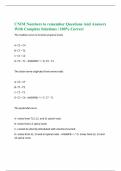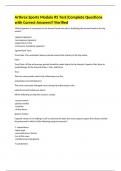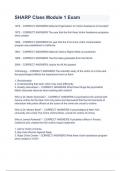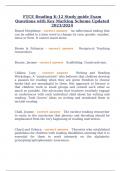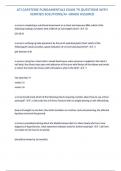Qualita've Research Summary
Boeije, H. Analysis in qualita3ve research.
Chapters 1, 2, 3, 4, 5, 6 and 9
Chapter 1: Introduc'on to Qualita've Research
Preparatory thoughts
Men3on the necessary prepara3ons when ini3a3ng scien3fic research
Science is only recognized and accepted as such when researchers s3ck to the rules that
apply to conduc3ng scien3fic research:
• Using a systema3c procedure
• Using approved methods and techniques
• Documen3ng in a way that allows others to asses the findings
Furthermore, before star3ng your research, you must think of a research topic, what type of
research is necessary (qualita3ve, quan3ta3ve or a combina3on), and what the purpose of
your study is.
Considering quan'ta've or qualita've research
Dis3nguishing between quan3ta3ve and qualita3ve research
Quan'ta've research:
• Literature and previously selected theory are used to deduce hypotheses and these
hypotheses (or proposi3ons) are tested by means of the research
• Observa3ons are made on a sizable number of cases, mainly by means of
standardized measures
• Results are reached by working with numbers
• Sta3s3cal criteria are used to determine whether the results offer support for the
hypotheses or not
• Subsequently, the finding are fed back into the theory in an aVempt to explain the
results and reflect on the implica3ons
Qualita've research: (generally starts with the assump3on that individuals have an ac3ve
role in the construc3on of social reality and that research methods that can capture this
process of social construc3on are required)
• Literature including theory is mainly used to understand what is going on in the field
and to discover theore3cal perspec3ves, including proper prospects to look at the
social phenomenon of interest
• Data collec3on takes place by means of semi-structured measuring instruments (that
are tailored to the research subject and refined as the research progresses)
• In general, the research sample should accurately represent the research subject and
must be studied intensively.
• During data analysis common themes and regulari3es are searched
• The findings consist of descrip3ons of the field using the various relevant, theore3cal
concepts necessary to interpret the par3cipants’ view of their social world and their
behaviour
,Explain the role of theory in deduc3ve and induc3ve approaches to research
Deduc've process: theory is the star3ng point for formula3ng hypotheses that will be tested
in research (employed in quan3ta3ve research)
Induc've process: a social phenomenon is explored in order to find empirical paVerns that
can func3on as the beginning of a theory (paramount in qualita3ve research).
In prac3se it is not black and white. Quan3ta3ve research can be used to explore scien3fic
domainsand make use of an induc3ve approach as well, while in qualita3ve research exis3ng
theory can be used more deduc3vely as a background to see whether it applies to other
se_ngs or contexts.
Define what is commonly referred to as paradigm
Paradigm: a framework for thinking about research design, measurement, analysis and
personal involvement that is shared by members of a speciality area. Paradigms reflect issues
related to the nature of social reality and to the nature of knowledge.
Know what paradigma3c issues qualita3ve researchers mostly agree on
Outline the origins and purposes of the grounded theory approach
Origins:
• Social science was dominated by hypothesis tes3ng and was devoid of any
connec3on to everyday reality.
• Ethnographic research was to preoccupied with descrip3ons instead of explana3on of
social phenomena
Purposes:
• Rekindling the vitality in empirical research
• Analysing qualita3ve data with a systemic approach
The data are analysed with a technique called coding, in which relevant parts of the data are
indicated and labelled. By constant comparison of the newly collected data with ini3al
results, the process gradually advances from coding parts of the data to conceptual
categories, and subsequently to conceptual modelling or theories development.
Define qualita've research and elaborate on its three key elements
The purpose of qualita3ve research is to describe and understand social phenomena in terms
of the meaning people bring to them. The research ques3ons are studied through flexible
methods enabling contact with the people involved to an extent that is necessary to grasp
what is going on in the field. The methods produce rich, descrip3ve data that need to be
interpreted through the iden3fica3on and coding of themes and categories leading to
findings that can contribute to theore3cal knowledge and prac3cal use.
The defini'on has three key elements:
1. Qualita3ve research is looking for meaning
2. Qualita3ve research is using methods enabling contact with or between humans /
par3cipants
3. Qualita3ve research involves the repor3ng of qualita3ve findings
,Reproduce the steps of the qualita3ve research process and place data analysis within this
process:
, Chapter 2: Research design
Name and reflect on all elements of a research plan
The research plan consists of the research ques3ons, the research purpose, an ethical
paragraph, a plan for dissemina3ng the findings and an outline of the overall research
strategy as well as the specific methods, techniques and instruments to be used.
Research proposal: needs to demonstrate what the research entails.
• What is being researched?
• Why is this subject examined?
• How will this be done?
• Where will the study take place?
Maxwell (2004) describes the research proposal as an argument which should convincingly
demonstrate why this research should be done, what ac3vi3es it will consist of, and to which
results it will lead.
An essen3al part of your analy3c plan in the research proposal is to indicate to reviewers
that data collec3on and data analysis alternate in qualita3ve research. This is a vital part of
the qualita3ve research procedure, and one of the main reasons that not all parts of the
research can be planned in advance.
Research ques'on: the research ques3on is the central ques3on which the researcher wants
to answer by doing the research.
Descrip3ve ques3ons deal with the what of social phenomena, while explanatory ques3ons
deal with the why of these phenomena.
Research purpose: two dis3nc3ons can be made with regard to research purpose.
• Research mainly aimed at descrip3on and research mainly aimed at understanding or
explana3on
• Fundamental and applied research
(Differences will be explained later)
Reflect on the use of literature in a qualita've study
Boeije (2009) challenges whether literature research actually relevant when conduc3ng
qualita3ve research…
• It was argued that, performing a literature review may block researchers from being
openminded towards the topic being researched.
However, currently - and in general - a proper literature review in qualita3ve research is
perceived as very important…
• …, to accumulate on to other / previous research findings
• …, to proper introduce the central problem area or domain
• …, to indicate the gaps in literature addressed by the study
• …, to convince funding commissioners of the (scien3fic) relevance of the proposed
study
Recognize a research ques3on that is framed in a way that demand qualita3ve methods
Boeije, H. Analysis in qualita3ve research.
Chapters 1, 2, 3, 4, 5, 6 and 9
Chapter 1: Introduc'on to Qualita've Research
Preparatory thoughts
Men3on the necessary prepara3ons when ini3a3ng scien3fic research
Science is only recognized and accepted as such when researchers s3ck to the rules that
apply to conduc3ng scien3fic research:
• Using a systema3c procedure
• Using approved methods and techniques
• Documen3ng in a way that allows others to asses the findings
Furthermore, before star3ng your research, you must think of a research topic, what type of
research is necessary (qualita3ve, quan3ta3ve or a combina3on), and what the purpose of
your study is.
Considering quan'ta've or qualita've research
Dis3nguishing between quan3ta3ve and qualita3ve research
Quan'ta've research:
• Literature and previously selected theory are used to deduce hypotheses and these
hypotheses (or proposi3ons) are tested by means of the research
• Observa3ons are made on a sizable number of cases, mainly by means of
standardized measures
• Results are reached by working with numbers
• Sta3s3cal criteria are used to determine whether the results offer support for the
hypotheses or not
• Subsequently, the finding are fed back into the theory in an aVempt to explain the
results and reflect on the implica3ons
Qualita've research: (generally starts with the assump3on that individuals have an ac3ve
role in the construc3on of social reality and that research methods that can capture this
process of social construc3on are required)
• Literature including theory is mainly used to understand what is going on in the field
and to discover theore3cal perspec3ves, including proper prospects to look at the
social phenomenon of interest
• Data collec3on takes place by means of semi-structured measuring instruments (that
are tailored to the research subject and refined as the research progresses)
• In general, the research sample should accurately represent the research subject and
must be studied intensively.
• During data analysis common themes and regulari3es are searched
• The findings consist of descrip3ons of the field using the various relevant, theore3cal
concepts necessary to interpret the par3cipants’ view of their social world and their
behaviour
,Explain the role of theory in deduc3ve and induc3ve approaches to research
Deduc've process: theory is the star3ng point for formula3ng hypotheses that will be tested
in research (employed in quan3ta3ve research)
Induc've process: a social phenomenon is explored in order to find empirical paVerns that
can func3on as the beginning of a theory (paramount in qualita3ve research).
In prac3se it is not black and white. Quan3ta3ve research can be used to explore scien3fic
domainsand make use of an induc3ve approach as well, while in qualita3ve research exis3ng
theory can be used more deduc3vely as a background to see whether it applies to other
se_ngs or contexts.
Define what is commonly referred to as paradigm
Paradigm: a framework for thinking about research design, measurement, analysis and
personal involvement that is shared by members of a speciality area. Paradigms reflect issues
related to the nature of social reality and to the nature of knowledge.
Know what paradigma3c issues qualita3ve researchers mostly agree on
Outline the origins and purposes of the grounded theory approach
Origins:
• Social science was dominated by hypothesis tes3ng and was devoid of any
connec3on to everyday reality.
• Ethnographic research was to preoccupied with descrip3ons instead of explana3on of
social phenomena
Purposes:
• Rekindling the vitality in empirical research
• Analysing qualita3ve data with a systemic approach
The data are analysed with a technique called coding, in which relevant parts of the data are
indicated and labelled. By constant comparison of the newly collected data with ini3al
results, the process gradually advances from coding parts of the data to conceptual
categories, and subsequently to conceptual modelling or theories development.
Define qualita've research and elaborate on its three key elements
The purpose of qualita3ve research is to describe and understand social phenomena in terms
of the meaning people bring to them. The research ques3ons are studied through flexible
methods enabling contact with the people involved to an extent that is necessary to grasp
what is going on in the field. The methods produce rich, descrip3ve data that need to be
interpreted through the iden3fica3on and coding of themes and categories leading to
findings that can contribute to theore3cal knowledge and prac3cal use.
The defini'on has three key elements:
1. Qualita3ve research is looking for meaning
2. Qualita3ve research is using methods enabling contact with or between humans /
par3cipants
3. Qualita3ve research involves the repor3ng of qualita3ve findings
,Reproduce the steps of the qualita3ve research process and place data analysis within this
process:
, Chapter 2: Research design
Name and reflect on all elements of a research plan
The research plan consists of the research ques3ons, the research purpose, an ethical
paragraph, a plan for dissemina3ng the findings and an outline of the overall research
strategy as well as the specific methods, techniques and instruments to be used.
Research proposal: needs to demonstrate what the research entails.
• What is being researched?
• Why is this subject examined?
• How will this be done?
• Where will the study take place?
Maxwell (2004) describes the research proposal as an argument which should convincingly
demonstrate why this research should be done, what ac3vi3es it will consist of, and to which
results it will lead.
An essen3al part of your analy3c plan in the research proposal is to indicate to reviewers
that data collec3on and data analysis alternate in qualita3ve research. This is a vital part of
the qualita3ve research procedure, and one of the main reasons that not all parts of the
research can be planned in advance.
Research ques'on: the research ques3on is the central ques3on which the researcher wants
to answer by doing the research.
Descrip3ve ques3ons deal with the what of social phenomena, while explanatory ques3ons
deal with the why of these phenomena.
Research purpose: two dis3nc3ons can be made with regard to research purpose.
• Research mainly aimed at descrip3on and research mainly aimed at understanding or
explana3on
• Fundamental and applied research
(Differences will be explained later)
Reflect on the use of literature in a qualita've study
Boeije (2009) challenges whether literature research actually relevant when conduc3ng
qualita3ve research…
• It was argued that, performing a literature review may block researchers from being
openminded towards the topic being researched.
However, currently - and in general - a proper literature review in qualita3ve research is
perceived as very important…
• …, to accumulate on to other / previous research findings
• …, to proper introduce the central problem area or domain
• …, to indicate the gaps in literature addressed by the study
• …, to convince funding commissioners of the (scien3fic) relevance of the proposed
study
Recognize a research ques3on that is framed in a way that demand qualita3ve methods




